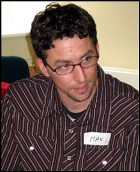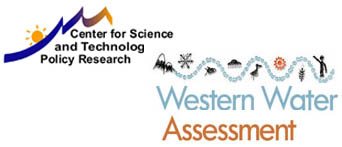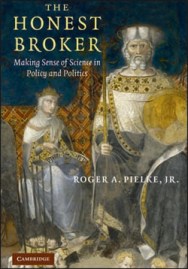Center News
Roger Pielke Jr. Launches New Blog, Retires Prometheus
 Our popular science policy blog, Prometheus, has been retired. We will keep the Prometheus archive up and available but there will be no new posts. Many thanks to our Prometheus readers and contributors over the years. If you would like to read announcements and news from the Center for Science and Technology Policy Research please visit our website.
Our popular science policy blog, Prometheus, has been retired. We will keep the Prometheus archive up and available but there will be no new posts. Many thanks to our Prometheus readers and contributors over the years. If you would like to read announcements and news from the Center for Science and Technology Policy Research please visit our website.
Roger Pielke, Jr., will continue his insightful, provocative blogging at his new site (please update your bookmarks accordingly!). Sample posts from Roger’s new blog:
Target 1939: A Case for Absolute Baselines
There has been some occasional chatter about the use of relative baselines in setting targets for greenhouse gas emissions, with some folks arguing for using a 1990 baseline and others suggesting 2005. How silly. How about just using absolute baselines? The following examples use carbon dioxide emissions.
If the world wants to achieve an 80% reduction in carbon dioxide emissions below 1990 levels this really means returning to 1939 levels of emissions.
For the US, a 17% reduction in carbon dioxide emissions below 2005 levels (such as in the Waxman-Markey Bill) represents a return to about 1990 levels. An 80% reduction represents a return to 1905 levels… Read more.
How to Get Climate Policy Back on Course
A report from a worldwide consortium of research institutes led by Oxford and the London School of Economics and Political Science argues that climate policy needs to focus on improving energy efficiency and decarbonising the energy supply, as opposed to setting emissions targets.
With the G8 set to meet in Italy this week, a report from a worldwide consortium of research institutes is arguing that the only policies that will work are those which focus on improvement in energy efficiency and the decarbonisation of energy supplies.
The report, published by the Institute for Science, Innovation and Society at the University of Oxford and the London School of Economics and Political Science’s Mackinder Programme, argues that this approach is more effective than a model based on emissions targets… Read more.
 Top Five Prometheus Posts
Top Five Prometheus Posts
Below are the Prometheus posts that generated the largest number of comments.
#1 The Collapse of Climate Policy and the Sustainability of Climate Science
February 7th, 2009 | 129 Comments
The political consensus surrounding climate policy is collapsing. If you are not aware of this fact you will be very soon. The collapse is not due to the cold winter in places you may live or see on the news. It is not due to years without an increase in global temperature. It is not due to the overturning of the scientific consensus on the role of human activity in the global climate system.
It is due to the fact that policy makers and their political advisors (some trained as scientists) can no longer avoid the reality that targets for stabilization such as 450 ppm (or even less realistic targets) are simply not achievable with the approach to climate change... Read more.
#2 David Whitehouse on Royal Society Efforts to Censor
September 21st, 2006 | 107 Comments
David Whitehouse is a former online science editor for the BBC. He has sent a letter to Benny Peiser, a prominent climate provocateur from the University of Liverpool who oversees the CCNet mailing list. Benny included Dr. Whitehouse’s correspondence on the Royal Society’s letter to ExxonMobil in his compilation yesterday. There is also apparently a second letter from the Royal Society to journalists, asking them to ignore people with perspectives outside the IPCC consensus.
Let me say in no uncertain terms that in my opinion the actions by the Royal Society are inconsistent with the open and free exchange of ideas, as well as the democratic notion of free speech. Here in the U.S. we have recently won a battle to allow scientists employed by government to speak... Read more.
#3 Politics and the IPCC, Again
March 1st, 2006 | 104 Comments
Anyone with concerns about the politicization of the IPCC, and its stance of “policy neutrality,” should raise an eyebrow at recent stories from the BBC and The Guardian. Leaking information before the report has gone through full review smacks of overt politicking. But more generally, those doing the leaking and their representations of what will be found in the IPCC are far from “policy neutral.” Perhaps it is time for the IPCC to dispense with the illusion of being policy neutral and simply admit its political agenda. As far as the “news” that has been leaked, it is hardly news. According to the Guardian: A draft of the next influential Intergovernmental Panel on Climate Change (IPCC) report will tell politicians that scientists are now unable to place a reliable upper limit on how quickly the atmosphere will warm as... Read more.
#4 The Helpful Undergraduate: Another Response to James Annan
May 16th, 2008 | 102 Comments
In his latest essay on my stupidity, climate modeler James Annan made the helpful suggestion that I consult a “a numerate undergraduate to explain it to [me].” So I looked outside my office, where things are quiet out on the quad this time of year, but as luck would have it, I did find a young lady named Megan, who just happened to be majoring in mathematics who agreed to help me overcome my considerable ignorance. The first thing I had to do was explain to Megan the problem we are looking at. I told her that we had 55 estimates of a particular quantity, with a mean of 0.19 and standard deviation of 0.21. At the same time we had 5 different observations of that same quantity, with a mean of –0.07 and standard deviation of 0.07. I wanted to know how similar or different from... Read more.
#5 The Swindle Ruling, British Culture, and Freedom of Expression
July 22, 2008 | 84 Comments
If you are paying attention to the latest dust up over climate change then you know that a judgment has been rendered by the relevant British authority (OFCOM) on complaints about the airing of a controversial documentary by UK Channel 4 challenging consensus climate science and politics, titled The Great Global Warming Swindle. The decision has led to a wide range of reactions and commentary (e.g., NYT’s Andy Revkin, Climate Audit’s Steve McIntyre, former IPCC chairman Bob Watson, and many, many others). Here I’d like to address several points that have nothing to do with the substance of the complaint… Read more.
Max Boykoff to join CSTPR
 We are thrilled to announce that Max Boykoff will be joining our Center this summer as a faculty member. Most recently Max was a Research Fellow in the Environmental Change Institute (ECI) as well as a Department Lecturer in the School of Geography and the Environment at the University of Oxford. He was previously affiliated with Christ Church College as a Postdoctoral Fellow. From 2006-2008, Max was a James Martin 21st Century Research Fellow at the University of Oxford ECI. Through this fellowship, he was involved in both the Climate Change Research Cluster and the Environmental Governance and Climate Policy groups.
We are thrilled to announce that Max Boykoff will be joining our Center this summer as a faculty member. Most recently Max was a Research Fellow in the Environmental Change Institute (ECI) as well as a Department Lecturer in the School of Geography and the Environment at the University of Oxford. He was previously affiliated with Christ Church College as a Postdoctoral Fellow. From 2006-2008, Max was a James Martin 21st Century Research Fellow at the University of Oxford ECI. Through this fellowship, he was involved in both the Climate Change Research Cluster and the Environmental Governance and Climate Policy groups.
He holds a Ph.D. in Environmental Studies from the University of California-Santa Cruz and Bachelor of Sciences from Ohio State University. His research interests include interactions between state and non-state actors at the interface of environmental science, policy and practice. Woven through these endeavors, he has engaged in two primary research areas: the cultural politics of climate change, and transformations of carbon-based economies and societies. Max’s work includes analysis of the media’s treatment of climate change – see for example The Real Swindle.
Max will give a talk "An Inconvenient Celebrity? Promises and Pitfalls of Celebrity Involvement in Climate Change Science, Policy and the Public" at the Center on Monday, October 26, 2009. The talk will be from 12:00 - 1:00 pm in the CSTPR Conference Room (directions), and is free and open to the public. Please join us in welcoming Max!
New Research Project on Drought Vulnerability
 The Center has a new Western Water Assessment-funded project, "A Drought Impact and Vulnerability Indicator Suite". Led by Center director Bill Travis with research assistant Kristin Gangwer, this project will create a set of indicators for assessing the impacts of drought across different sectors (urban, agricultural, water, recreation), with the goal of developing both research-quality time series that can be normalized and analyzed for trends, and applied indicators that can help managers assess impacts and changing vulnerabilities. The search for and collection of indicators goes back a long way in impacts research, so there is a track record to build on. However, a lack of continuity, and changes in baselines, vulnerabilities, and monitoring programs, have made it difficult to develop indicators useful for inter-comparison. The project will canvass existing indicators and determine the appropriate time scales and geographical frameworks for measuring drought impacts and vulnerability, with an initial focus on the Interior West. Indicators will be made available on the Center and Western Water Assessment websites.
The Center has a new Western Water Assessment-funded project, "A Drought Impact and Vulnerability Indicator Suite". Led by Center director Bill Travis with research assistant Kristin Gangwer, this project will create a set of indicators for assessing the impacts of drought across different sectors (urban, agricultural, water, recreation), with the goal of developing both research-quality time series that can be normalized and analyzed for trends, and applied indicators that can help managers assess impacts and changing vulnerabilities. The search for and collection of indicators goes back a long way in impacts research, so there is a track record to build on. However, a lack of continuity, and changes in baselines, vulnerabilities, and monitoring programs, have made it difficult to develop indicators useful for inter-comparison. The project will canvass existing indicators and determine the appropriate time scales and geographical frameworks for measuring drought impacts and vulnerability, with an initial focus on the Interior West. Indicators will be made available on the Center and Western Water Assessment websites.
The Honest Broker Reviewed
 Roger Pielke’s book The Honest Broker was recently reviewed by Kevin Curry and Susan Clark in the journal Policy Sciences. Here are a few excerpts from the very positive review:
Roger Pielke’s book The Honest Broker was recently reviewed by Kevin Curry and Susan Clark in the journal Policy Sciences. Here are a few excerpts from the very positive review:
“Roger Pielke Jr. offers a way to sort through the complicated relationships between scientists and decision making. His perceptive, clearly worded, and engaging book offers both important academic insights and a model of professional practice for anyone wishing to engage effectively with politics and policy.”
“Some reviewers (e.g., Rosenberg 2007; Skolnikoff 2008) disapprove of Pielke’s criticism of issue advocacy, but they seem to miss the crux of his argument. Pielke does not argue against issue advocacy. In fact, he argues that all four of the roles he describes for scientists are ‘critically important and necessary in a functioning democracy’ (p. 7). Pielke’s argument is simply that scientists should clearly identify when they are acting as issue advocates. They should not obscure their goal and standpoint by using the assumptions of the linear model of science, or assume value consensus is present when it is not, or claim to be concerned with intelligence when they are actually concerned with promotion.”

